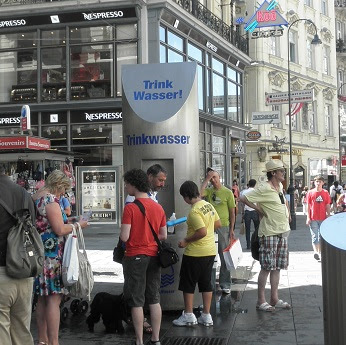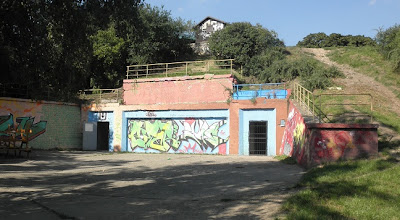After a six hour ride through some pretty areas, we arrived in Munich on Friday afternoon. Despite getting a bit lost, we soon settled into our hostel and went to work finding food. We settled on a nearby Turkish place, since this is actually quite a popular thing to eat in Germany due to all the Turkish immigrants. I got to surprise and amuse the workers by speaking Turkish, though it was very clear that I was an American.
We returned to the hostel to prepare for a pub crawl/beer tour. Our group was mostly filled with obnoxious drunken Australians, but we still had a pretty good time and got to experience the beer culture of Munich. This city truly is the beer capital of Germany, and quite possibly the world. Beer frequently comes as a full liter when ordered. This is Bryan with an empty glass, to demonstrate how huge these things are:
Beer is often consumed in beer gardens, which are pretty much what they sound like: outdoor areas shaded by chestnut trees and filled with picnic tables where everyone can sit down and have a few beers in the nice weather:
You've probably heard of Oktoberfest, which is the world's largest beer festival (actually, I think it's the largest festival, period). This takes place in Munich every year, drawing in millions of beer fans. Munich kind of feels like a year-round beer festival, though. We toured a couple other beer houses and gardens, but we were responsible drinkers and went to bed at a reasonable hour to prepare for the next morning's tour.
We did a 4-hour walking tour of the city, which showed us all of the important sites while also informing us of the storied past of the locations we passed. I was surprised to find that many of the old-looking buildings around the city were actually only 60 years old, reconstructed to look old after the originals were destroyed in World War II. The city was decimated by the bombings throughout the war. Only a few landmarks survived, including the tower of the picturesque town hall:
This is also where the famous glockenspiel show happens. A couple times each day, some tunes are played on a glockenspiel and little puppet things put on an automated show in those windows. Hundreds of people gather in Marienplatz to watch and listen. We caught the noon show, and it was pretty cute. We picked up some lunch, which consisted of a bratwurst and some beer (of course!). We got it from a little shop like this, of which there are many in the city:
While eating and drinking, we were able to stroll through the Viktualienmarkt, primarily a food and flower market. There were many stalls selling really pretty things like this:
Those are flowers and herbs, woven together and scented to decorate houses and make them smell nice. Surprisingly, it seemed to be mostly locals shopping in this area and many of the shop owners didn't speak English, something we hadn't encountered elsewhere.
We quickly moved on to some historic sites in the city, including many points of importance in Nazi history. This city was the birthplace of Hitler's Nazi movement, and it's very clear that there is a struggle between being proud of the city's history while not glorifying the horrible things that happened there. We visited the Feldherrnhalle in Odeonsplatz, one of the most famous sites of the city. It was here that Hitler gave many of his rallying speeches, and it was also a location where passersby were required to give the Nazi salute in honor of fallen Nazis:
As a result of this law, many Muncheners (people in Munich) at the time chose to take a path behind this area to avoid saluting, which is now marked by a golden trail in the road:
We also visited the Hofbrauhaus, a beer hall where Hitler held the first meeting of his National Socialists party in 1920. It remains a very popular beer hall despite this history. Once the tour concluded and we were thoroughly depressed, we moved on to explore the huge English Gardens, a popular hangout spot for locals and tourists alike. It's much like Central Park or Golden Gate Park, though bigger. There are some fast-moving controlled rivers through the park, and quite a few people actually surf on them:
The park also has the very popular Chinese Tower (yes, a Chinese tower in the English gardens in Germany), where you can get some food and beer while listening to traditional Bavarian music:
We got some beers and sweets and enjoyed the warm weather for a bit before heading off to find dinner. We had venture fairly far to find a gasthaus (traditional restaurant) that wasn't already full, but ended up finding a nice one populated mostly by locals. We got some tasty food (and beer, of course) and retired back at the hostel after a long day of walking.
Next: England!


















































